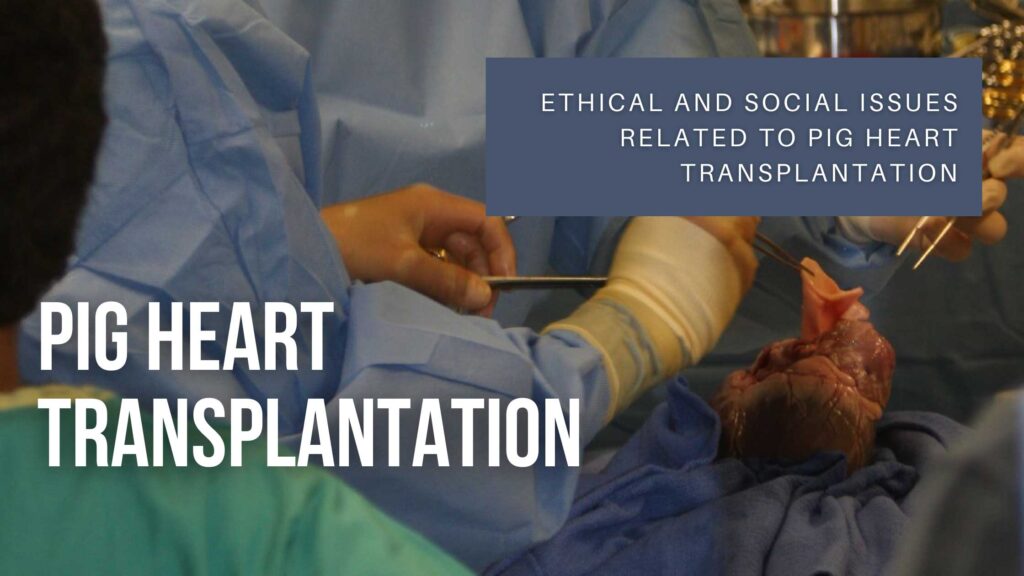
by
Faiza Syed
Recently, a pig heart was successfully transplanted into a human recipient. The 57-year-old is making a healthy recovery as per recent news reports. While this is being hailed as a breakthrough in the field of xenotransplantation. There are chances of known as well as unforeseen complications in the future. The procedure was deemed necessary as the patient was too unwell to receive a human heart and there simply was no other option. One of the issues that is of primary concern is the ethics of it all, such as how useful will it be? How will the procedure affect the patient? What about animal welfare? And finally, what if public perception is the deciding factor that xenotransplantation becomes legal or outlawed?
This article discusses the three major ethical concerns that may arise due to xenotransplantation.
Patient Health and Public Safety Concerns
Perhaps one of the biggest concern is organ rejection. Something that happens when the human immune system recognizes the pig’s heart as a foreign object and begins attacking it. The chances of hyper-acute rejection are high with transplantation of a pig’s heart.
Another major health concern is the virus transmission that could occur from pig to humans after transplantation. These viruses, known as porcine endogenous retroviruses or PERV for short are harmless to pigs, but can wreak havoc in a human recipient. We have witnessed a first-hand occurrence of such a pig-to-human virus transmission in 2009, when the swine flu took close to quarter of a million lives. In another instance, Nipah virus caused an encephalitis epidemic in Malaysia and Singapore. Therefore, there are not only concerns of donor-to-recipient virus transmission but also transmission of infected host to other humans.
The issue of viruses being transmitted from donor to recipient, also calls for the need to disclose patient identity. This would be because the pig heart recipients would need to be monitored continually for signs of disease. This would greatly compromise patient privacy. Meaning that the pig heart recipients will have to forgo their rights to privacy, which, could lead to them being labelled as ‘freaks ’or ‘misfits’. All these societal issues combined would make life quite difficult for the patient.
Summary
The first and foremost ethical concern with pig heart transplants is the health effects on the recipient. This includes organ rejection, infection with porcine viruses and antibiotic resistant bacteria. Secondly, horizontal transfer of the viruses to the general population may occur, thus requiring continuous need to monitor patient whereabouts, and contacts. This compromises patients’ right to privacy and subjects them to being an oddity in society.
Issues with Animal Welfare
Pigs have been used as a source of food in many countries. In fact, close to a billion pigs are slaughtered each year. The ethical debate, however, is not rearing pigs for transplantation, but the main issue is with the conditions in which these animals will need to be kept. Xenotransplantation requires that pigs be kept in highly sterile environments. This means that contact with outside world would be impossible for these animals. This is to prevent any disease or contamination in the pigs’ bodies. This is in contrast to the widely accepted husbandry practices which include caring for the animal and the herd as a whole. Animal husbandry practices also include allowing the animal to thrive in a more natural habitat. In the case of pigs raised for xenotransplantation this would not be possible and the animals will need to be isolated and be kept in lab-like conditions similar to how we keep chimps and mice for experiments.
Thus, a better approach to this dilemma would be to outline ethical guidelines based off of laboratory animals rather than animal husbandry practices.
Summary
Pigs raised for xenotransplantation must be kept in isolation at all times to prevent infection and contamination of the donor organs. This is in contrast to the animal husbandry practices that dictate that animals should be kept in their natural habitats. A better direction to solving this dilemma would be to develop guidelines similar to ethical guidelines for in-lab animals such as chimps and mice.
Public Acceptance of Xenotransplantation
The third issue pertains to the public perception of these types of procedures being performed as a routine surgical procedure. General lack of scientific knowledge combined with inauthentic sources of knowledge can lead the public to formulate completely abstract understanding about the xenotransplantation process and its need. This would then bleed down to the policy makers, who are elected members of the public. Ultimately this would mean the passing regulations necessary to make xenotransplantation an approved surgical procedure in the near future could become a tedious task.
Given the context, it would be difficult for the general public to distinguish scientifically sound results with conspiracy theories based-off pseudoscience. We as humans are more accepting of fantastical outcomes as compared to boring numbers or facts. This could be a cause of public outcry and general disapproval of the xenotransplantation procedure.
Therefore, scientists have a responsibility to communicate about xenotransplantation on more public forums or social media channels so that it reaches the general public and becomes more widely accepted.
Summary
Public perception of xenotransplantation has the power to affect future policies regarding the procedure. It can either be outlawed or become a routine practice. It is therefore the responsibility of the scientific community to be more vocal on public and social media forums in order to spread more awareness about the procedure.
Reference article – Rollin, B. E. (2020). Ethical and Societal Issues Occasioned by Xenotransplantation. Animals, 10(9), 1695.
This article was written by Faiza Syed, an independent technical content developer and Chief Marketing Officer at WEmpower Pakistan .





Recent Comments